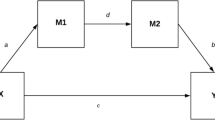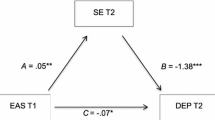Abstract
The attributional reformulation of learned helplessness theory proposes that causal judgments on the internal/external dimension lead to the depressive deficit of low self-esteem. Attention is drawn to limitations in the definition of internality/externality offered by the theory and in the methods of measurement available. It is pointed out that there are noncausal cognitions, such as self-evaluative judgments, which are characteristic of depression and which could provide an alternative explanation of reduced self-esteem.
Similar content being viewed by others
References
Abramson, L. Y., Seligman, M. E. P., & Teasdale, J. D. (1978). Learned helplessness in humans: Critique and reformulation.Journal of Abnormal Psychology, 87 49–74.
Bandura, A. (1978). The self system in reciprocal determinism.American Psychologist, 33 344–358.
Beck, A. T., Rush, A. J., Shaw, B. F., & Emery, G. (1979).Cognitive therapy of depression. New York: Guilford.
Bibring, E. (1953). The mechanism of depression. In P. Greenacre (Ed.),Affective disorders. New York: International Universities Press.
Brewin, C. R. (1980). Work role transitions and stress in managers: Illustrations from the clinic.Personnel Review, 9 27–30.
Brewin, C. R. (1984). Attributions for industrial accidents: Their relationship to rehabilitation outcome.Journal of Social and Clinical Psychology, 2 156–164.
Brewin, C. R. (1985). Depression and causal attributions: What is their relation?Psychological Bulletin, 98 297–309.
Brewin, C. R., Robson, M., & Shapiro, D. A. (1983). Social and psychological determinants of recovery from industrial injuries.Injury: The British Journal of Accident Surgery, 14 451–455.
Brewin, C. R., & Shapiro, D. A. (1984). Beyond locus of control: Attributions of responsibility for positive and negative outcomes.British Journal of Psychology, 75 43–49.
Carlsmith, J. M., & Gross, A. E. (1969). Some effects of guilt on compliance.Journal of Personality and Social Psychology, 11 232–239.
Coyne, J. C., & Gotlib, I. H. (1983). The role of cognition in depression: A critical appraisal.Psychological Bulletin, 94 472–505.
Cunningham, M. R., Steinberg, J., & Grev, R. (1980). Wanting to and having to help: Separate motivations for positive mood and guilt-induced helping.Journal of Personality and Social Psychology, 38 181–192.
Fincham, F. D., & Jaspars, J. M. (1980). Attribution of responsibility: From man the scientist to man as lawyer. In L. Berkowitz (Ed.),Advances in experimental social psychology, (Vol. 13). New York: Academic Press.
Freedman, J. L., Wallington, S. A., & Bless, E. (1967). Compliance without pressure: The effect of guilt.Journal of Personality and Social Psychology, 7 117–124.
Harvey, M. D., & Rule, B. G. (1978). Moral evaluations and judgments of responsibility.Personality and Social Psychology Bulletin, 4 583–588.
Ickes, W., & Layden, M. A. (1978). Attributional styles. In J. H. Harvey, W. J. Ickes, & R. F. Kidd (Eds.),New directions in attributional research (Vol. 2, pp. 119–152). Hillsdale, NJ: Erlbaum.
Janoff-Bulman, R. (1979). Characterological versus behavioral self-blame: Inquiries into depression and rape.Journal of Personality and Social Psychology, 37 1798–1809.
Kanfer, R., & Zeiss, A. M. (1983). Depression, interpersonal standard setting, and judgments of self-efficacy.Journal of Abnormal Psychology, 92 319–329.
Klein, D. C., Fencil-Morse, E., & Seligman, M. E. P. (1976). Learned helplessness, depression and the attribution of failure.Journal of Personality and Social Psychology, 33 508–516.
Konoske, P., Staple, S., & Graf, R. G. (1979). Compliant reactions to guilt: Self-esteem or self-punishment.Journal of Social Psychology, 108 207–211.
Kovacs, M., & Beck, A. T. (1978). Maladaptive cognitive structures in depression.American Journal of Psychiatry, 135 525–533.
Peterson, C., Luborsky, L., & Seligman, M. E. P. (1983). Attributions and depressive mood shifts: A case study using the symptom-context method.Journal of Abnormal Psychology, 92 96–103.
Peterson, C., Schwartz, S. M., & Seligman, M. E. P. (1981). Self-blame and depressive symptoms.Journal of Personality and Social Psychology, 41 253–259.
Peterson, C., & Seligman, M. E. P. (1984). Causal explanations as a risk factor for depression: Theory and evidence.Psychological Review, 91 347–374.
Peterson, C., Semmel, A., von Baeyer, C., Abramson, L. Y., Metalsky, G. I., & Seligman, M. E. P. (1982). The attributional style questionnaire.Cognitive Therapy and Research, 6 287–300.
Raps, C. S., Peterson, C., Reinhard, K. E., Abramson, L. Y., & Seligman, M. E. P. (1982). Attributional style among depressed patients.Journal of Abnormal Psychology, 91 102–108.
Rehm, L. P. (1982). Self-management in depression. In P. Karoly & F. H. Kanfer (Eds.),Self management and behavior change. From theory to practice. New York: Pergamon Press.
Ross, L. (1977). The intuitive scientist and his short-comings. In L. Berkowitz (Ed.),Advances in experimental social psychology (Vol. 10). New York: Academic Press.
Seligman, M. E. P., Abramson, L. Y., Semmel, A., & von Baeyer, C. (1979). Depressive attributional style.Journal of Abnormal Psychology, 88 242–247.
Shaver, K. G. (1975).An introduction to attribution processes. Cambridge, Massachusetts: Winthrop.
Stratton, P., Heard, D., Hanks, H., Munton, A., Brewin, C. R., & Davidson, C. (in press). Coding causal beliefs in natural discourse.British Journal of Social Psychology.
Tennen, H., & Eller, S. J. (1977). Attributional components of learned helplessness and facilitation.Journal of Personality and Social Psychology, 35 265–271.
Weiner, B., Russell, D., & Lerman, D. (1979). The cognition-emotion process in achievementrelated contexts.Journal of Personality and Social Psychology, 37 1211–1220.
Author information
Authors and Affiliations
Rights and permissions
About this article
Cite this article
Brewin, C.R. Internal attribution and self-esteem in depression: A theoretical note. Cogn Ther Res 10, 469–475 (1986). https://doi.org/10.1007/BF01173298
Issue Date:
DOI: https://doi.org/10.1007/BF01173298




